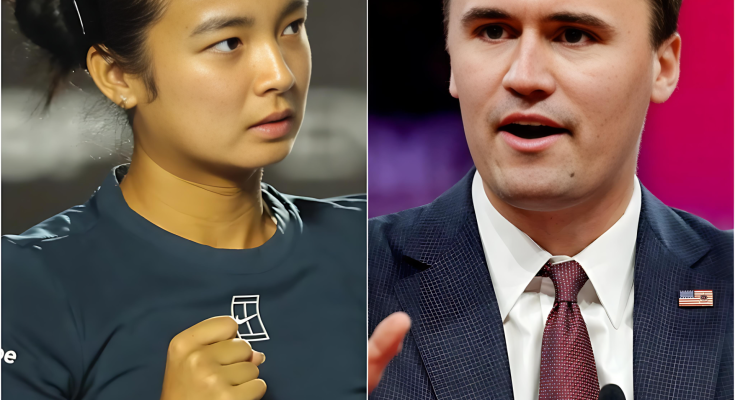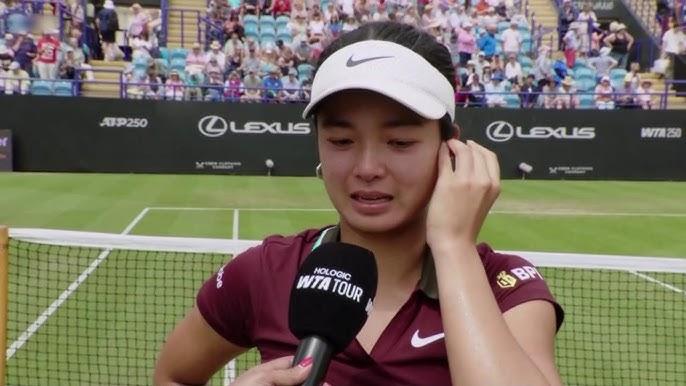The global tennis community is still reeling from the sudden and tragic passing of Charlie Kirk, a figure who, despite his controversial statements, remained a prominent voice in sports commentary. But just as fans and colleagues began to process the grief, a shocking twist electrified the internet. The Filipino tennis prodigy, Alexandra Eala, known as her nation’s brightest young hope, ignited a storm of emotions with a single tweet—an action now being described as the most shocking since Kirk himself publicly branded her a “NATIONAL SHAME” following her elimination at the 2021 US Open Junior.
The timing could not have been more jarring. Within hours of the announcement of Kirk’s death, Eala’s official Twitter account lit up with words that immediately set social media ablaze. While the exact message was brief, its implications were explosive. She wrote:
“He called me a shame. But I learned that true strength comes from surviving shame.”
Seven hours later, the tweet had already garnered over one million likes, thousands of retweets, and endless waves of commentary. What many interpreted as a mix of grief, defiance, and redemption soon became the focal point of heated global debate.
The reference to Kirk’s now-infamous 2021 comment cut deep into old scars. That year, Alexandra Eala, just 16, entered the US Open Juniors with high expectations after her success at the Rafa Nadal Academy and her ITF titles. However, she was eliminated earlier than many anticipated. The defeat stung, but what truly shocked fans was Kirk’s reaction. In an interview clip that went viral, he labeled her “a NATIONAL SHAME,” claiming she was overrated and lacked the discipline to compete on the sport’s biggest stages.
For many in the Philippines, his words were not just an attack on Eala but on their pride as a tennis nation. Fans rallied around the young athlete, defending her against what they saw as an unfair and humiliating insult. But the wound lingered in memory, a painful reminder of the pressure and scrutiny young athletes face on the world stage.
Fast forward to 2025: Kirk’s tragic passing left much of the sports world in mourning. Yet Eala’s tweet, while not overtly disrespectful, reopened old debates. Was it a cathartic expression of pain and survival? Or was it poorly timed, disrespecting the dead?
Fans were sharply divided. One viral response read: “Alex has every right to speak her truth—he hurt her deeply when she was just a teen. This is her closure.” Another, equally viral, took the opposite stance: “This was not the time. Whatever Kirk said, he cannot defend himself now. She should have stayed silent.”
The clash of perspectives created a storm that spilled over into mainstream media. CNN Sports dedicated a segment to the controversy, while ESPN hosted a panel debating the ethics of athletes responding to criticism after a critic’s death.
What made the tweet even more powerful was that it came from Alexandra Eala, who has long been hailed as a national hero in the Philippines. She is the face of tennis for a nation that has struggled to gain recognition on the global stage. Her victories in junior Grand Slams and on the ITF circuit have been celebrated as triumphs not just for her but for her entire country.
Now, the very same fans who once defended her are split, some praising her bravery and others questioning her judgment. Local Philippine sports media has labeled it “The Tweet That Shook the Nation.”
The controversy goes beyond Eala and Kirk. It has reignited discussions about how young athletes are treated by critics, the lasting scars of public humiliation, and whether athletes should be allowed to speak their truth regardless of timing. Psychologists weighed in, suggesting Eala’s words reflected “a healthy process of reclaiming identity after public shaming.” Yet ethicists countered, saying her timing overshadowed the larger tragedy of Kirk’s passing.
Interestingly, several current and former tennis stars subtly showed support for Eala. Coco Gauff liked the tweet, while Rafael Nadal’s academy shared a cryptic message: “True champions grow stronger in adversity.” Neither mentioned Kirk by name, but fans interpreted the gestures as quiet solidarity with the Filipina star.
For Alexandra Eala, the path forward is uncertain. She has not deleted the tweet, nor has she issued clarification. Her silence in the aftermath has only fueled more speculation. Was this her final word on Kirk, or is a longer statement coming? Will the WTA or tournament organizers weigh in, or will the storm pass as quickly as it rose?
One thing is undeniable: with just 14 words, Alexandra Eala shifted the global tennis conversation from mourning to controversy, from sorrow to debate. Her courage—or recklessness, depending on whom you ask—ensured that Charlie Kirk’s name, and the insult he once hurled at her, will not fade quietly into the archives of tennis history.
As fans continue to argue and analysts dissect every angle, the sports world finds itself speechless once more. Not just by the loss of Charlie Kirk, but by the stunning way Alexandra Eala chose to respond to a wound that never truly healed.




